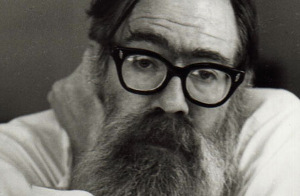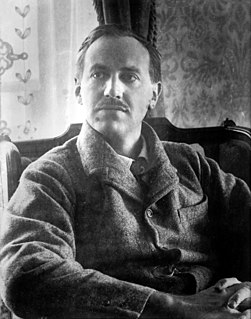A Quote by Horace Walpole
It amazes me when I hear any person prefer blindness to deafness. Such a person must have a terrible dread of being alone. Blindness makes one totally dependent on others, and deprives us of every satisfaction that results from light.
Related Quotes
Sin is to a nature what blindness is to an eye. The blindness of an evil or defect which is a witness to the fact that the eye was created to see the light and, hence, the very lack of sight is the proof that the eye was meant... to be the one particularly capable of seeing the light. Were it not for this capacity, there would be no reason to think of blindness as a misforture.
I don't know if anyone has noticed but I only ever write about one thing: being alone. The fear of being alone, the desire to not be alone, the attempts we make to find our person, to keep our person, to convince our person to not leave us alone, the joy of being with our person and thus no longer alone, the devastation of being left alone. The need to hear the words: You are not alone.
I am just as deaf as I am blind. The problems of deafness are deeper and more complex, if not more important than those of blindness. Deafness is a much worse misfortune. For it means the loss of the most vital stimulus- the sound of the voice that brings language, sets thoughts astir, and keeps us in the intellectual company of man.
I do strongly feel that among the greatest pieces of luck for high achievement is ordeal. Certain great artists can make out without it, Titian and others, but mostly you need ordeal. My idea is this: the artist is extremely lucky who is presented with the worst possible ordeal which will not actually kill him. At that point, he's in business: Beethoven's deafness, Goya's deafness, Milton's blindness, that kind of thing.
I certainly wasn't seeking any degree, the way a college confers a status symbol upon its students. My homemade education gave me, with every additional book that I read, a little bit more sensitivity to the deafness, dumbness and blindness that was afflicting the black race in America. Not long ago, an English writer telephoned me, asking questions. One was, "What's your alma mater?" I told him, "Books.
There are normal times when it is wholly admirable to be steadfast, resolute, unconflicted, and therefore when integrity is unmistakenly a virtue. The person of integrity knows what to do, and does it. But as we have been exploring, there are also times when certainty and single-mindedness indicate something less admirable: a deafness to voices that should be heard or a blindness to aspects of a situation that need to be considered.
prayer, and only prayer, restores my vision to one that more resembles God's. i awake from blindness to see that wealth lurks as a terrible danger, not a goal worth striving for; that value depends not on race or status but on the image of God every person bears; that no amount of effort to improve physical beauty has much relevance for the world beyond.
Late have I loved you, O beauty ever ancient, ever new. Late have I loved you. You have called to me, and have called out, and have shattered my deafness. You have blazed forth with light and have put my blindness to flight! You have sent forth fragrance, and I have drawn in my breath, and I pant after you. I have tasted you, and I hunger and thirst after you. You have touched me, and I have burned for your peace.
To me, the remarkable thing is it's pretty much unanimous the way blind people have been perceived in all cultures and for millennia. The first is, if they can't see, they must be stupid. The second one is, and this is a very old one, that blindness is such a terrible thing that it must be a curse from God for some evil that you committed.































